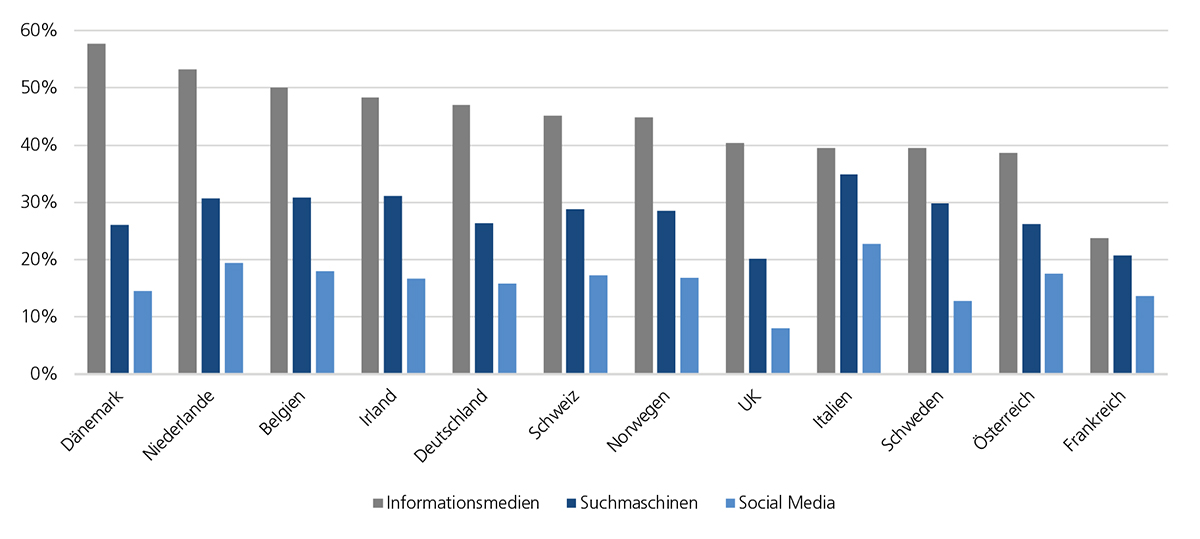Consuming little news: Group of the "news deprived" is growing
In Switzerland, there are more and more people with a far below-average news consumption. The proportion of the population who are "news deprived" rose by 15 percentage points from 2009 to 2019 to 36 percent. In the 16 to 29 age group, the figure is as high as 56 percent.

This is the finding of the authors of the latest "Quality of the Media" yearbook. According to the study, not only the "news-deprived" are undersupplied with relevant hard news, but also the "global surfers. While the "news-deprived" generally consume little news, the "global surfers" are considered to be news-savvy, but because of their media menu they are insufficiently confronted with regional and national reporting.
However, the supply of offers from within the country is necessary in order to be able to exercise basic democratic rights on an informed basis or to participate in the public sphere of a country in which one lives, the study states.
News deprivation is problematic in several respects. It goes hand in hand with lower political knowledge and less participation in the political-democratic process. News deprivation also correlates with lower trust in government institutions.
Last but not least, the social image of the "news-deprived" is more emotionally and threateningly charged: Scandals and crises, accidents, catastrophes and attacks find their way into the news feeds of such user groups to a greater extent. And: The priority use of social media promotes news deprivation.

Decrease in old-world news repertoires and increase in new-world news repertoires: The plot shows the share trends of the six repertoire types in the period from 2009 to 2019 (n = 37,623). The dotted line represents the trend if no update of the repertoires had occurred. Legend: The share of "news deprived" increases from 21 percent in 2009 to 36 percent in 2019.
The problem of news deprivation is by no means limited to Switzerland, the report continues. This is shown by international research on news avoidance. The proportion of "news avoiders" who actively and consciously refuse to read the news is between 15 and 41 percent in Western democracies.

Frequency of use of media categories for news purposes: Shown are the proportions of respondents who indicated "often" or "very often" as frequency of use (n = 37,623; source: data based on the annual GfK/fög media usage survey). Legend: In 2019, 70% of respondents use social media often or very often for news purposes.
Trust in traditional media
Despite the growing importance of platforms such as Facebook, Google, WhatsApp, Snapchat and Instagram: In 38 countries surveyed, including Switzerland, classic information media are trusted significantly more (47 percent) than search engines (29 percent) or social media (17 percent) as sources of information.

Media trust in international comparison: The chart shows for Switzerland and the reference countries the proportion of respondents who say they trust the information media, search engines and social media predominantly or strongly (source: Reuters Institute 2019). Legend: In Switzerland, 47% of respondents say they trust the media predominantly or strongly.
The most intensive social media users, i.e., the youngest respondents, distrust the news on social media the most (62 percent). Overall, there is the remarkable finding that the increasing use of social media goes hand in hand with falling trust ratings in these platforms.
This is an important finding for Swiss information journalism, according to the yearbook: Despite the high and growing importance of social media as sources, users tend to be skeptical about social platforms and are obviously aware of the important function of professional information media as guarantors of an enlightened social discourse.
Willingness to pay for online news remains low in Switzerland and many other countries. Only 11 percent of Swiss media users say they will pay for digitally available news in 2019.

Willingness to pay for online news in international comparison The chart shows for Switzerland and the reference countries the proportion of respondents who say they have paid for online news in the last year (source: Reuters Institute 2019). Legend: In Switzerland, 11% of respondents say they have paid for online news in the past year.
For more media patriotism
The authors of the study write that platformization is weakening professional Swiss information journalism, which can be seen, among other things, in the increasing concentration of media in Switzerland. However, professional information media and editorially produced news remain indispensable for a democratic society.
What is needed, therefore, is a new media patriotism. This must be guided by the insight that local journalistic information media are indispensable for a democratic nation-state like Switzerland, but that they are primarily under pressure from outside, i.e. from global tech platforms.
The support of the national system of professional information media would have to include both state measures and measures beyond that. In the area of government measures, proposals for taxing advertising revenues generated on journalistic content by tech platforms were already made in last year's "Quality of the Media" yearbook, as was the proposal to expand direct media subsidies.
In the non-governmental sector, cooperation between media organizations should be intensified. There is a vision of a Swiss digital omnium for professional information journalism, which relies on cooperation wherever journalistic competition is not diminished as a prerequisite for an enlightened, diverse discourse.
Published for the tenth time
The yearbook "Quality of the Media" is published for the tenth time. It is written by the Research Institute Public and Society (FÖG) of the University of Zurich. It is financed by the Kurt Imhof Foundation for Media Quality and the University of Zurich.
Around 2,000 Internet users in German-speaking and French-speaking Switzerland were surveyed. In addition, survey data from an annual media usage study conducted by fög in collaboration with GfK Switzerland was included in the analyses. As part of this study, around 3400 online interviews have been conducted at the beginning of each year since 2009. (SDA)








